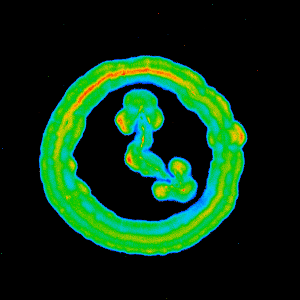
Bacillus subtilis: light-emitting luciferase reporter shows a clock-regulated gene. | © Ella Baker, Jack Dorling / John Innes Centre
Bacteria make up more than 10% of all living things but until recently we had little realization that, as in humans, soil bacteria have internal clocks that synchronize their activities with the 24-hour cycles of day and night on Earth.
New research shows just how complex and sophisticated bacterial circadian clocks are, clearing the way for an exciting new phase of study. This work will provide diverse opportunities, from precision timing of the use of antibiotics, to bioengineering smarter gut and soil microbiomes.
An international collaboration from LMU, The John Innes Centre (Norwich, UK), The Technical University of Denmark (Lyngby), and Leiden University, made the discovery by probing gene expression as evidence of clock activity in the widespread soil bacterium Bacillus subtilis.
Lead author Dr. Francesca Sartor (LMU) reports, “the circadian clock in this microbe is pervasive: we see it regulating several genes, and a range of different behaviours.”
“It is astonishing that a unicellular organism with such a small genome has a circadian clock with some properties that evoke clocks in more complex organisms,” added Professor Antony Dodd from the John Innes Centre.
Previous work by this collaborative team had demonstrated the existence of a circadian clock in a lab-derived strain of this bacteria. This was the first-time circadian clocks had been observed in the bacterium Bacillus subtilis. Researchers used a technique which inserts an enzyme called luciferase that produces light when a gene is expressed. This bioluminescence guided the team in monitoring the bacterial clock as conditions varied.
The senior author of the publication, Professor Martha Merrow at LMU said: “This study shows that circadian clocks are widely found in Bacillus subtilis. We might capitalize on knowledge of the clock to improve health outcomes and increase sustainability of food production or biotechnology.”









